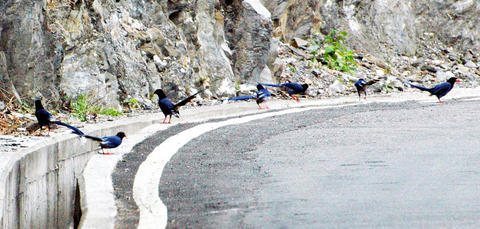The country's efforts to save an endemic rare bird, the Formosan blue magpie, have borne fruit, a local conservationist said yesterday.
Liao Shi-ching (
"It is rare to see so many of these birds together," Liao said, adding that the scene could serve as evidence of Taiwan's achievement in conserving the endangered bird species.

PHOTO: CNA
"The picture really indicates that Taiwan's conservation work is going very well," Liao said, "I have even seen families of Formosan blue magpies near Taipei city."
Liao and other members of the birding association are frequently out in areas where the birds are known to visit and rarely do they see so many birds at the same time.
However, Liao declined to say whether this was a clear indication that the birds' numbers have significantly increased. He said a proper study should be undertaken by the Council of Agriculture.
But Liao said he believed the numbers are "increasing" because of the introduction of the Wildlife Protection Act in 1991 and increasing public awareness of the need to protect the birds.
The Formosan blue magpie, also known as the "Long-tailed mountain lady" is one of Taiwan's 14 endemic bird species. It lives in the mountains at elevations of 300m to 1,200m.
Although one of the main threats to the survival of Formosan blue magpies is illegal capture, Liao said reports of such cases are decreasing because of rising awareness of preservation.
The Formosan blue magpie was named Taiwan's national bird last year.

US President Donald Trump said "it’s up to" Chinese President Xi Jinping (習近平) what China does on Taiwan, but that he would be "very unhappy" with a change in the "status quo," the New York Times said in an interview published yesterday. Xi "considers it to be a part of China, and that’s up to him what he’s going to be doing," Trump told the newspaper on Wednesday. "But I’ve expressed to him that I would be very unhappy if he did that, and I don’t think he’ll do that," he added. "I hope he doesn’t do that." Trump made the comments in

Tourism in Kenting fell to a historic low for the second consecutive year last year, impacting hotels and other local businesses that rely on a steady stream of domestic tourists, the latest data showed. A total of 2.139 million tourists visited Kenting last year, down slightly from 2.14 million in 2024, the data showed. The number of tourists who visited the national park on the Hengchun Peninsula peaked in 2015 at 8.37 million people. That number has been below 2.2 million for two years, although there was a spike in October last year due to multiple long weekends. The occupancy rate for hotels

A cold surge advisory was today issued for 18 cities and counties across Taiwan, with temperatures of below 10°C forecast during the day and into tonight, the Central Weather Administration (CWA) said. New Taipei City, Taipei, Taoyuan and Hsinchu, Miaoli and Yilan counties are expected to experience sustained temperatures of 10°C or lower, the CWA said. Temperatures are likely to temporarily drop below 10°C in most other areas, except Taitung, Pingtung, Penghu and Lienchiang (Matsu) counties, CWA data showed. The cold weather is being caused by a strong continental cold air mass, combined with radiative cooling, a process in which heat escapes from

Snow this morning fell on Alishan for the first time in seven years, as a strong continental cold air mass sent temperatures plunging across Taiwan, the Central Weather Administration (CWA) said. The Alishan weather station, located at an elevation of about 2,200m in central Taiwan, recorded snowfall from 8:55am to 9:15am, when the temperature dropped to about 1°C, the CWA said. With increased moisture and low temperatures in the high-altitude Alishan area, the conditions were favorable for snow, CWA forecaster Tsai Yi-chi (蔡伊其) said. The last time snow fell at the Alishan weather station was on Jan. 10, 2018, while graupel fell there